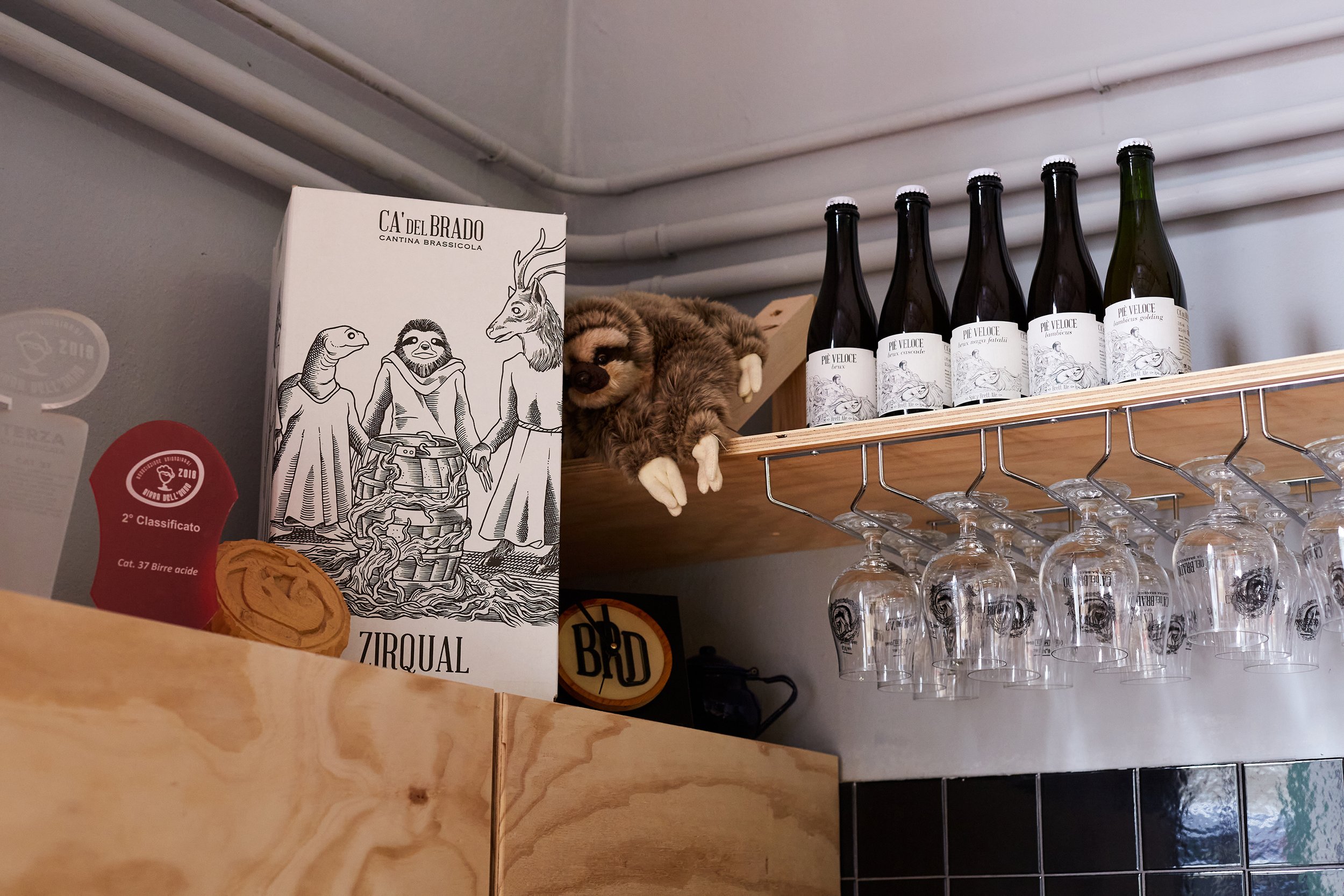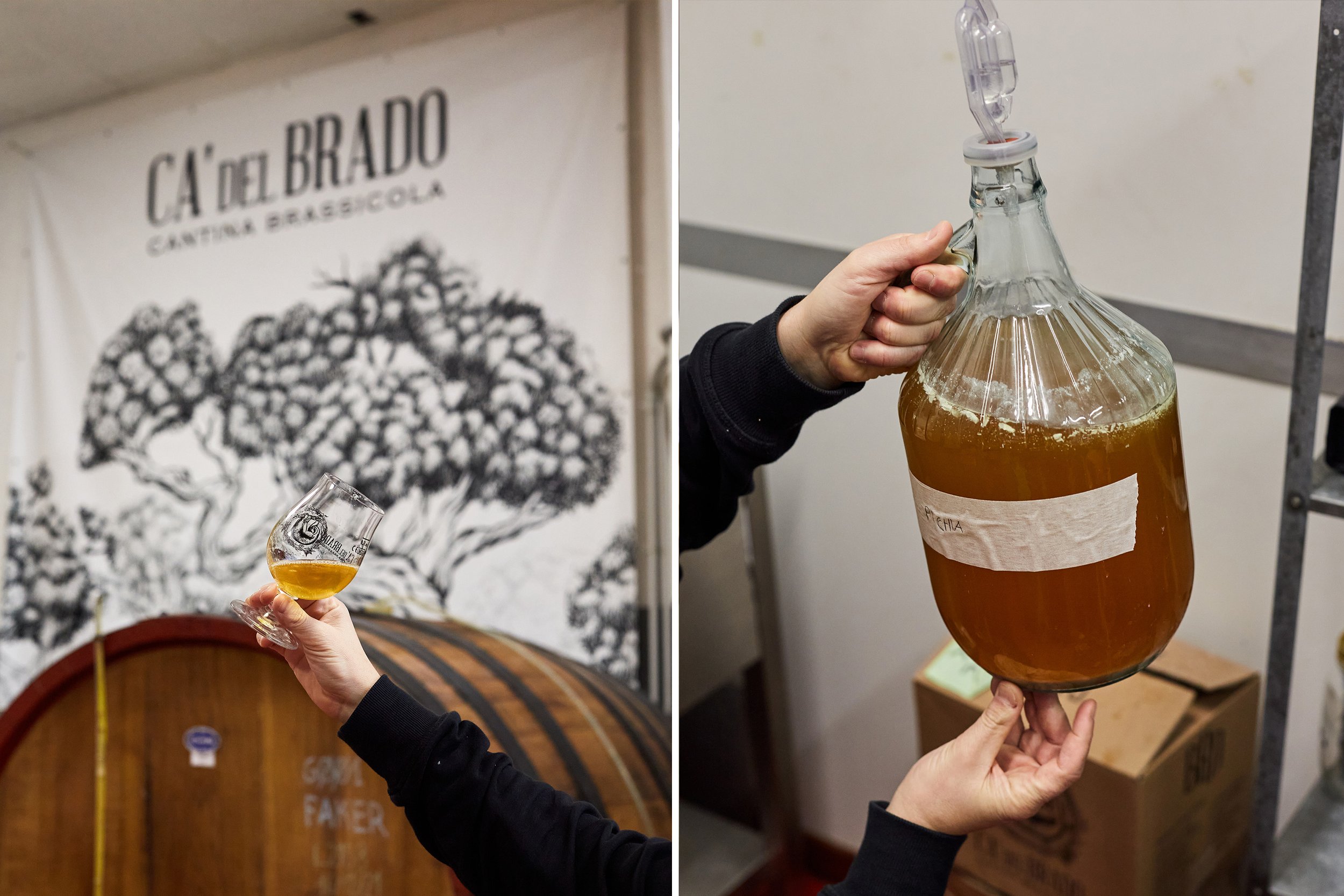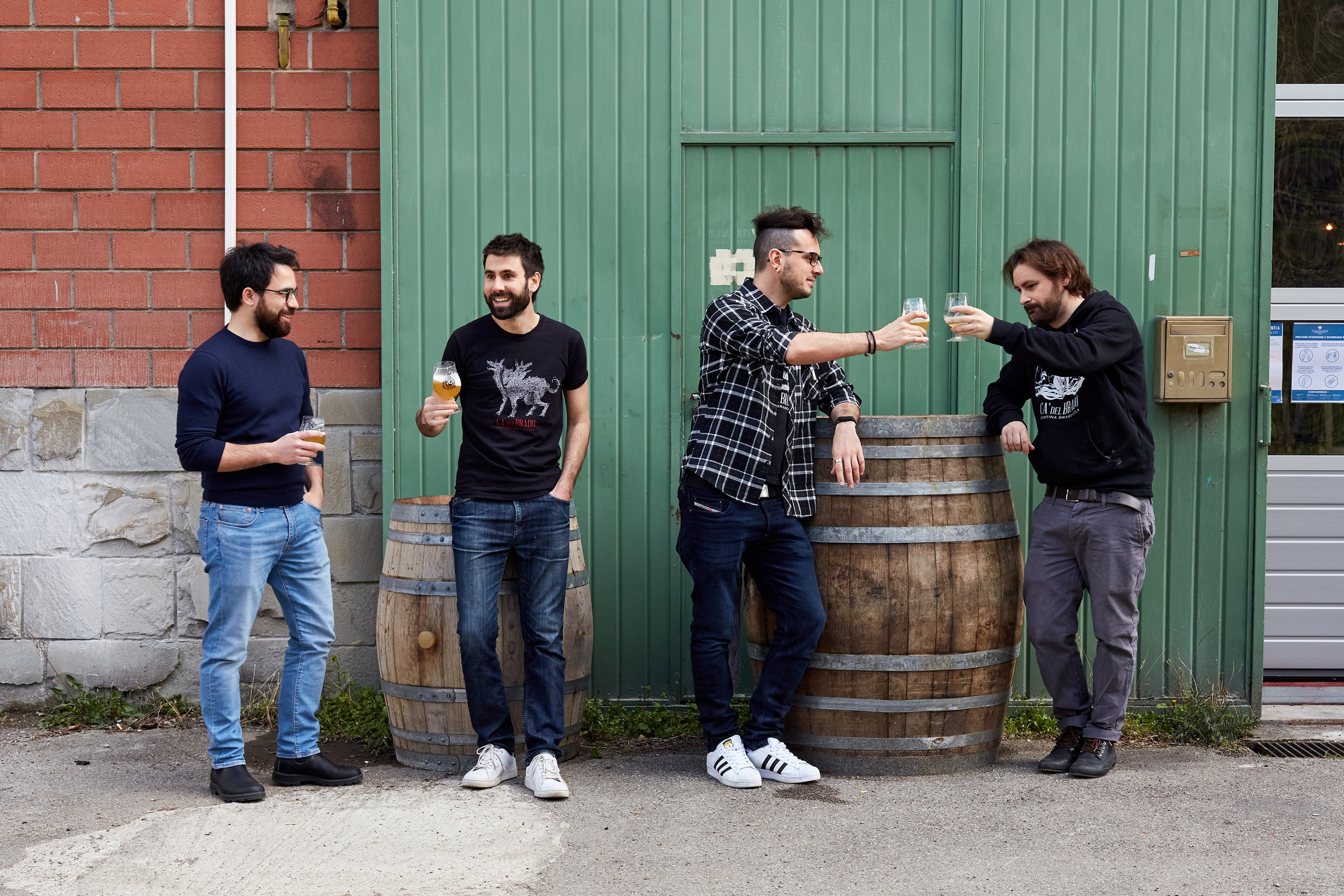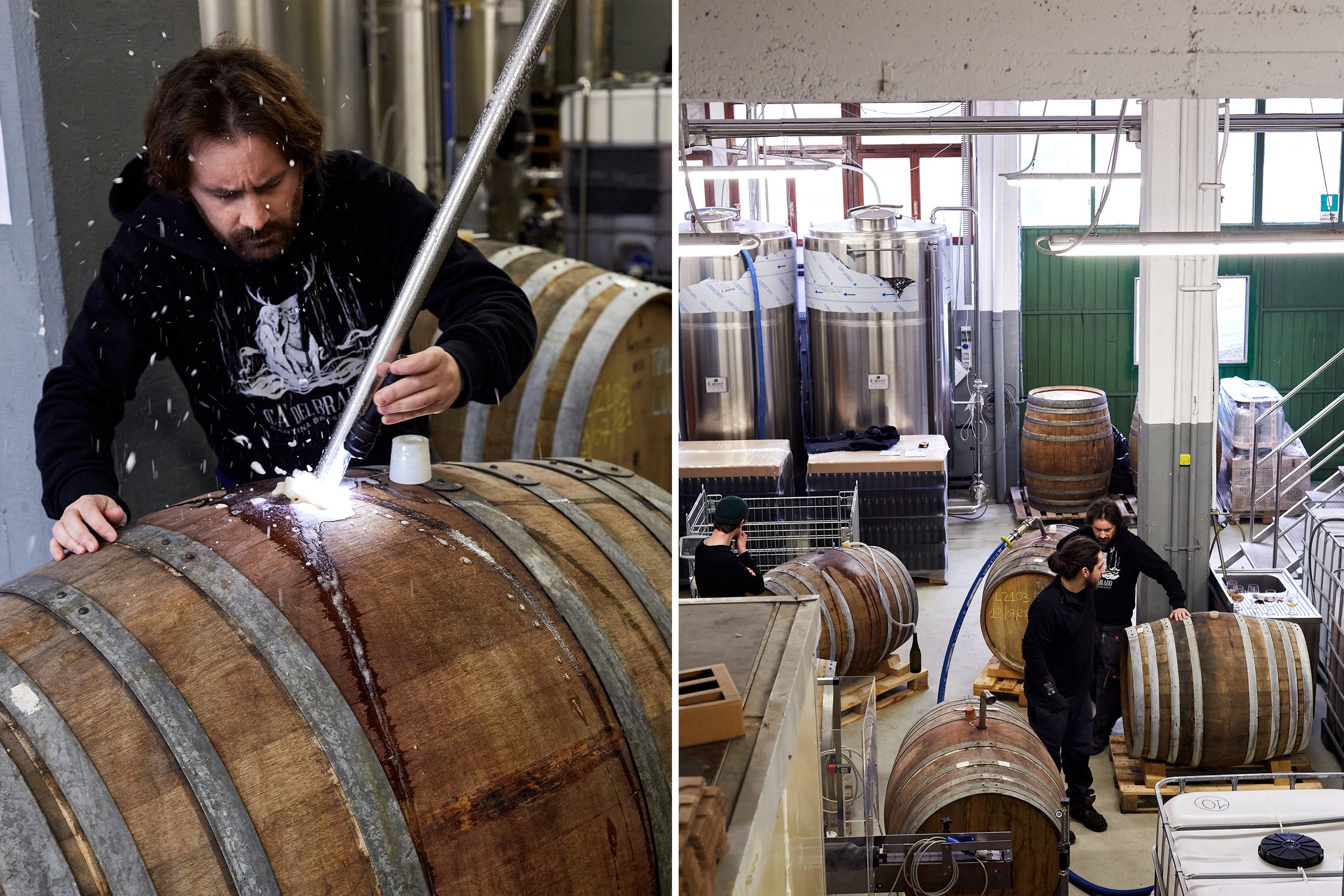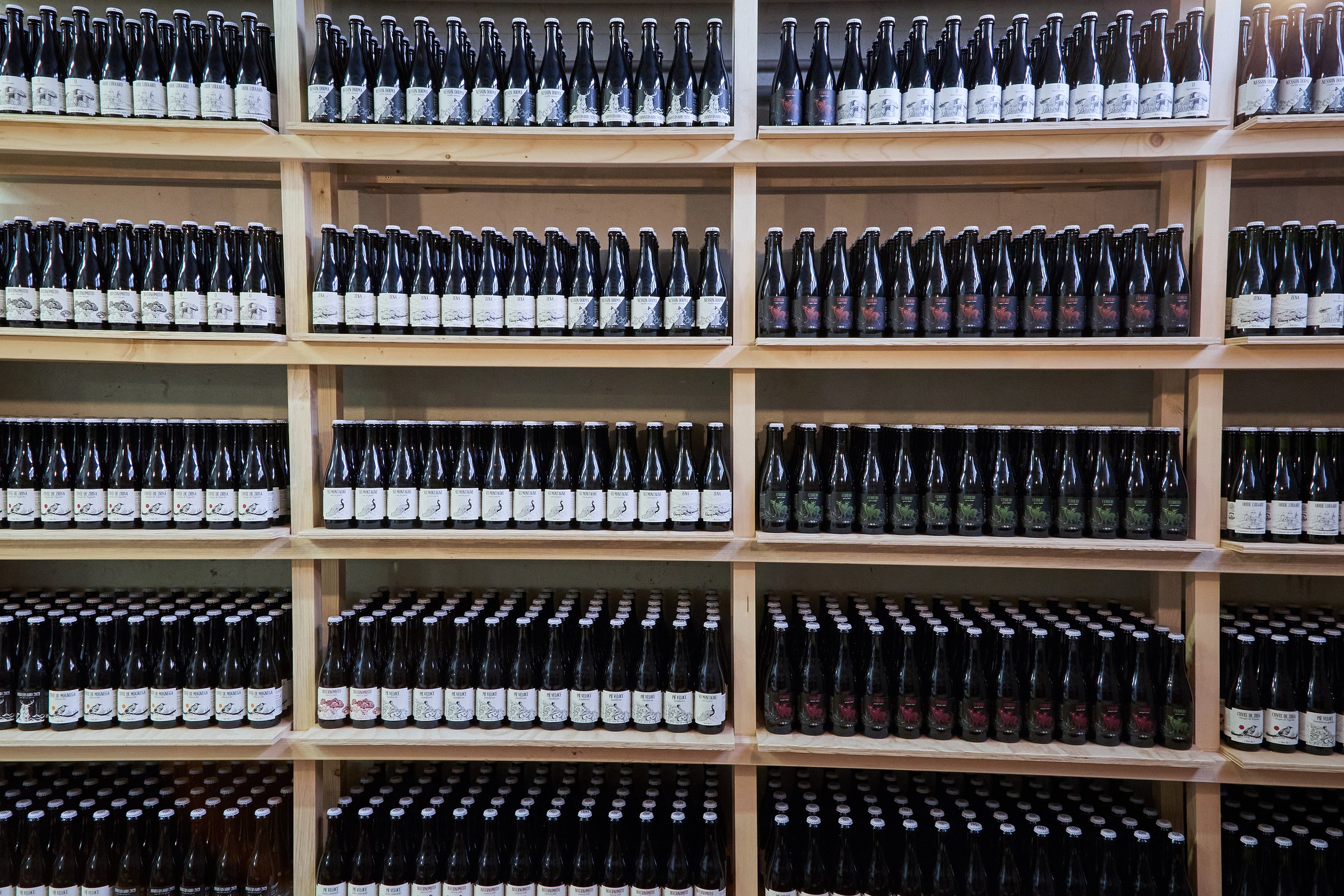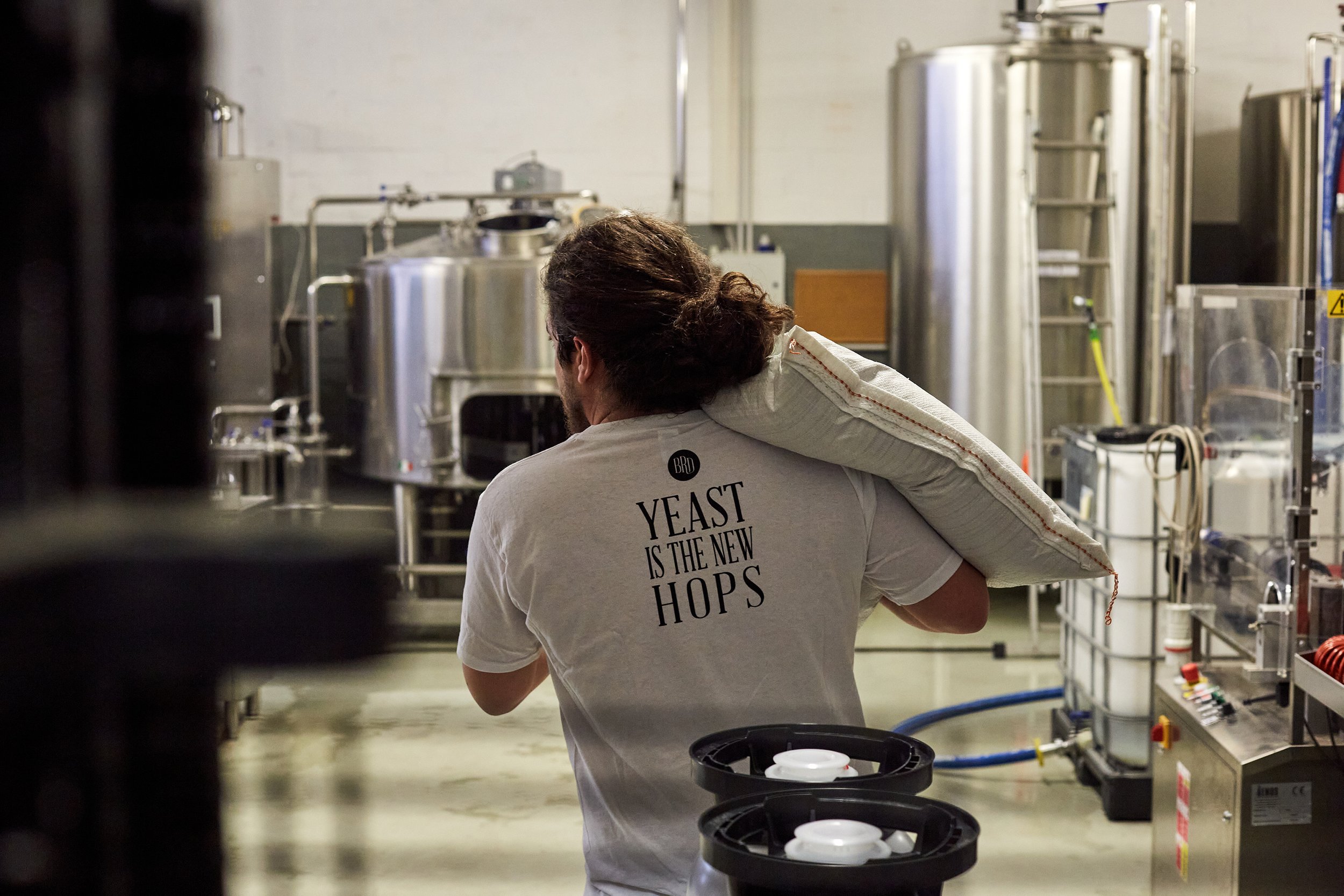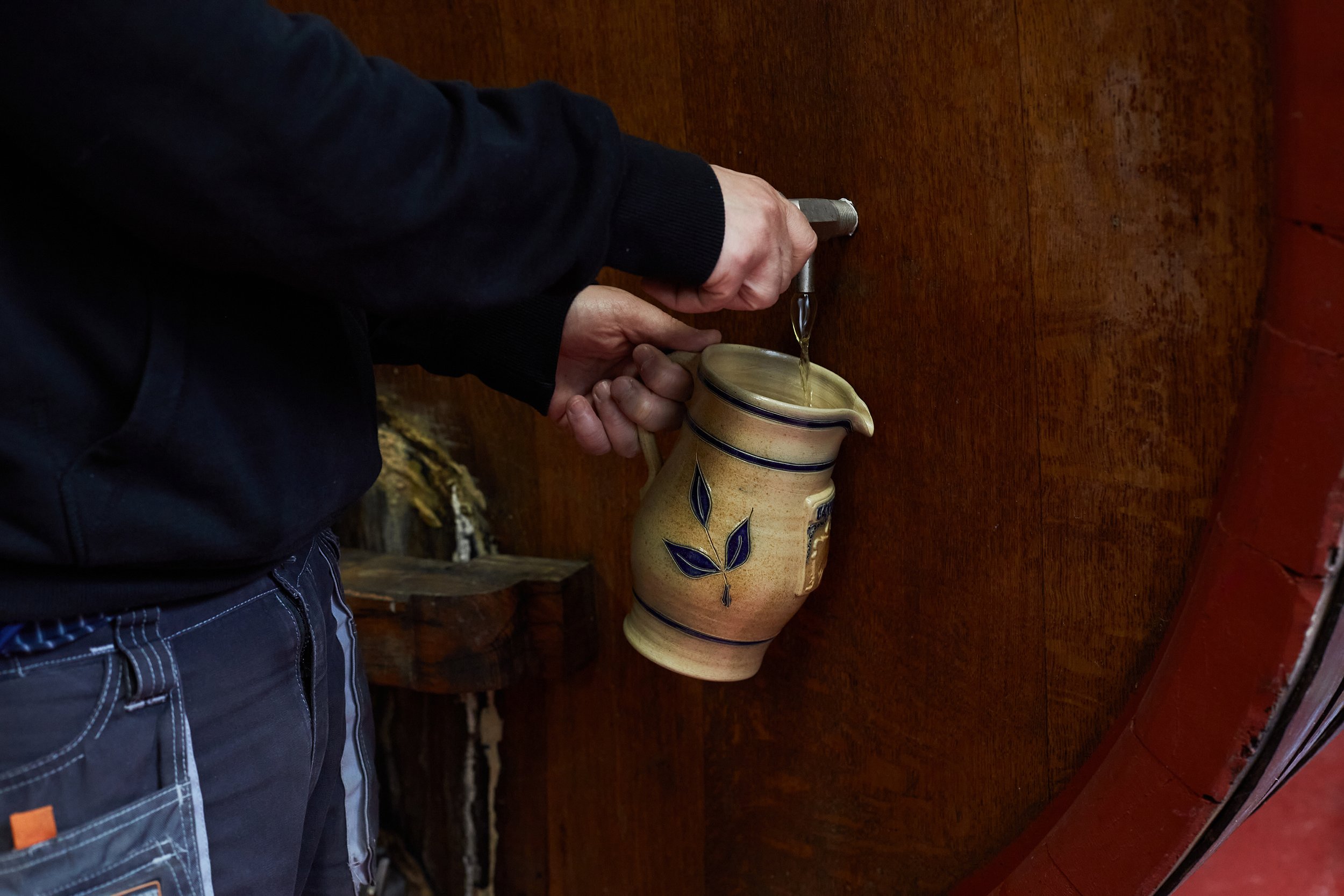The city of Bologna is a buoyant and gluttonous bubble. It is defined by the inflexible rules of ragù, by tortellini in brodo, by its adherence to tradition as well as its frenetic, even rebellious cultural scene. Here, the speed of modern life seems to be challenged by the tranquility of long dinners and even longer drinking sessions, the kind where—if you’re lucky, brave, or well-liked enough—you might find yourself staying for a lock-in on the dark side of the bar’s shutters.
These are some of the reasons why Bologna is, among the cities that never sleep, also late to rise, developing a deep and slow philosophy about life and relationships in the process. While I wait at bus stop number 96 in the early morning, just a few steps from the Basilica of San Petronio, a feeble fog sneaks into the medieval porticos that still protect the intimacy of Bologna’s city center. From here, it will take me 30 minutes by bus—crossing steep hills, local markets, and semi-deserted streets—to arrive in Rastignano, one of the tiny towns scattered on the city’s surrounding slopes.
It’s here, in this quiet village, where the brewery Ca’ del Brado opened some seven years ago. While Rastignano might seem an unlikely home for a business like this one, both share a resistance to speed. As far as Ca’ del Brado’s philosophy goes, time isn’t just the basis of work—it’s a key ingredient that makes its beers possible, and which connects it directly to the region’s culture, community, and way of life.
When I meet Ca’ del Brado founders Andrea Marzocchi, Luca Sartorelli, Mario Di Bacco, and Matteo D’Ulisse, they explain that, from day one, their brewery was meant to be perceived as more than just a place of production. They intended it to be an ecosystem as well as a home, for both wild yeast and people.
This ethos has its roots in the cooperative traditions of the Emilia Romagna region, where strong relationships among citizens, institutions, and companies have historically been the basis for happy and sustainable growth. That’s reflected in the brewery’s name: ca’, shortened from the Italian word for house, casa, and brado, which comes from the ancient Greek word bradùs, meaning slowness, with additional connotations of both wildness and freedom.
For Marzocchi, the brewery’s sales, marketing, and culture manager, making beer has meant forging strong connections with local farmers, producers, and the surrounding community. “Becoming artisans has allowed us to take back time, focusing on what we love, what we are looking for in our lives and for others,” Marzocchi says. “This has meant a complete rediscovery of our region and its local traditions, starting from the relationships we built with BrewLab, and by growing new ones.”
BrewLab, which was run by the Ca’ del Brado founders between 2009 and 2015, was one of the first cultural associations dedicated to beer in Bologna. Through its classes, workshops, travels, beer tours, and festivals like Birrai Eretici (or Heretic Brewers), the organization built a community of beer lovers and producers, strengthening relationships and shaping the experiences that would later lead to the birth of Ca’ del Brado.
“Becoming artisans has allowed us to take back time, focusing on what we love, what we are looking for in our lives and for others. This has meant a complete rediscovery of our region and its local traditions, starting from the relationships we built with BrewLab, and by growing new ones.”
Di Bacco, D’Ulisse and Sartorelli, formerly university friends, met Marzocchi via BrewLab. Later, he became a member of the association and one of the teachers of the tasting classes. In 2015, when BrewLab was about to reach the end of its road, all four started dining together, a tradition they still keep every Monday in Rastignano. During those discussions around the table, they focused on their idea for a new project: Ca’ del Brado, through which they wanted to chart a new course in the Italian craft beer world, finding a slow and precise methodology to produce sour and wild beers as the perfect synthesis between their passion for beer, their sense of community, and their connection to the region.
That meant a direct link to local producers, with the brewery choosing to buy raw materials from the area as much as possible, and collaborating with other breweries in the region, as well as institutions like the University of Modena and Reggio Emilia.
“We have always thought that our community had to be open, and operate to promote culture and visibility to the craft beer movement and our territories,” Sartorelli says. “We believe that collaborating with different partners make us stronger, and lets us produce better beers and improve our ideas. This means sharing our production methods and the results of our research—and the mistakes—with everyone; listening to drinkers, breweries, and friends to have direct feedback; and finally, finding inspiration in this positive space of debate and mutual growth.”
As Mario Di Bacco, the brewery’s lab and tech manager, tells me, the team drew an immediate connection between the world of wild beers and the Italian wine cellar. “We started immediately to experiment with different types of Brettanomyces. Their aging in barrels convinced us to believe in the concept of ‘cantina brassicola’ that we started developing in 2015,” he says. “It would have been impossible to think about Ca’ del Brado without the association that formed us as brewers and created the relations with people we still collaborate with.”
At that time, a project dedicated to sour and wild beers was almost unheard of in Italy, with just a few small examples operating in the country. The concept of a “cantina brassicola,” meaning brewing cellar, was an innovation not only for the Italian craft beer movement, but also for the Italian legal code, which slowed down the project so much that it did not officially open until late 2016. The problems were related to the unusual way that Ca’ del Brado was set up, which combined the typical activities of a brewery with those of a wine cellar. Until 2020, the brewery didn’t make its own wort. Instead, the wort was produced according to Ca’ del Brado’s recipes at BrewFist in Codogno, Lombardy, an arrangement that was not codified or recognized under Italian law at the time.
“When we had already found our location in Rastignano, we could not start because our idea of a ‘cantina brassicola’ was a gray area in Italian law,” D’Ulisse says, “It meant almost a year and a half of waiting, submitting tons of documents to convince the bureaucracy to give us the greenlight. We kept working, and no one left us alone. On the contrary, people became increasingly interested in our project.” The legal category created by Ca’ del Brado, he notes, established a new precedent under Italian law, allowing other new producers like Cask Irpinia in Campania to function in a similar way.
The months of waiting for legal approval became a sort of initiation rite for Ca’ del Brado: a moment to deepen the relationships built in the BrewLab years and give the team’s new philosophy its final dimension. Once they found their site in Rastignano, in a small nook under a state road overpass, they enclosed it in order to protect its ecosystem, and began renovating and adapting it to welcome its first barrels.
“When we had already found our location in Rastignano, we could not start because our idea of a ‘cantina brassicola’ was a gray area in Italian law. It meant almost a year and a half of waiting, submitting tons of documents to convince the bureaucracy to give us the greenlight. We kept working, and no one left us alone. On the contrary, people became increasingly interested in our project.”
D’Ulisse shows me a photo he thinks is the most representative of that time. In it, the four founders are pouring a bottle of wild beer into a barrel, in an act of foundation and intention. “This was our baptism. We were visibly younger than we are today, and we were putting inside the barrel not only the microbiological starters for the cellar but our experience as beer lovers and our thoughts. Everything in this photo seems wrong—our pose, the camera out of focus, our tiredness—but it perfectly represents how we were feeling at this crucial moment.”
The waiting time soon became the time to evolve, both for the beers and the relationships between Ca’ del Brado’s founders. “The legislative problems put two choices in front of us: Give up, or fully believe in our project,” Marzocchi says. “We got to know each other better, working shoulder to shoulder every night, on the weekend, and during holidays to give birth to our first beers. We continued like this until 2020, when Luca started to work only for Ca’ del Brado.”
After a few months, he says, the brewery was invited to a festival in Brussels. After that, Ca’ del Brado’s beers began to be requested by pubs and people the team knew from its BrewLab years.
At Il Punto, a craft beer bar in Bologna, owner Camilla Rodella recalls when Ca’ del Brado took its first steps: “Their idea of sour beers was different and it was a challenge also for us, as distributors and a pub. Because of the friendship we had grown throughout the years, we continued to push and support them, giving them advice and feedback. Although their first beers were great, they were not so easy to introduce to people. The road they traced with the idea of a ‘cantina brassicola’ has led to the rise of new producers and a new chapter in terms of wild fermentation in this country.”
In the beginning, the problems at Ca’ del Brado were not only related to legislation. Finding the wild yeast they wanted to use was not easy. Brettanomyces in liquid form was not common, still considered impure and dangerous in comparison to clean and easy-to-control Saccharomyces. “Our choice to work with wild yeast was difficult,” Di Bacco says. “We could only choose between an external laboratory that could supply us with the yeasts we had selected or propagate them ourselves. Working with living materials has confronted us with the reality that you cannot control everything.”
The team constructed a yeast propagator with help from Enrico Govoni, the head brewer at Vecchia Orsa, one of the first breweries in Bologna. “Thanks to this instrument we were finally able to give yeasts and production all the time and peace they needed to develop naturally,” Di Bacco says.
That natural development involves much more than just giving the yeast time to develop. It is more holistic, about creating a suitable space where ingredients, yeasts, and barrels can work naturally, looking for the kind of harmony the ancient Greeks called Kairos: the opportune, or critical, moment.
“Our choice to work with wild yeast was difficult. We could only choose between an external laboratory that could supply us with the yeasts we had selected or propagate them ourselves. Working with living materials has confronted us with the reality that you cannot control everything.”
Their work as brewers seems to undergo a transformation in line with that idea. The brewing process is defined by strict control, attentive to the smallest variations. But the aging process is one of relaxed balance, imitating the style of winemakers who let the environment, and the evolution brought by fermentation and time, take the lead.
Di Bacco confirms that the brewery doesn’t aim to completely control the work of the yeast. “That could limit the funkiness we are looking for,” he says. “In our idea, the concept of slowness concerns the right moment to act when it is needed, doing the minimum requested to preserve the spontaneous interactions that take place inside the barrels.”
In that way, time becomes its own necessary ingredient in the beer-making process. This process consists of a series of fermentations, which start in steel and then move on to barrels. Here, old and young batches are blended together to maintain the bacterial flora, and create a continuity between each production, until the final refermentation in the bottle.
For Ca’ del Brado, the yeasts it works with are as important as hops are to IPA brewers. That yeast-derived character is delicate and balanced in fruited beers like Cuvée de Zrisa (made with local cherries), Cuvée de Pesga (nectarines), and Cuvée de Mugnega (apricots). The brewery’s cultures produce stronger, leathery aromas in long-aged Saisons like Nessun Dorma; combine with spices to create special sour beers; and are crossed with winemaking traditions when used in slightly sweet and acidic Grape Ales.
“Our production settles a link between the brewer’s work, which means studying and producing the right kind of wort, choosing hops, and creating a base for the beer, to that of the ancient cellarman who limits his efforts and monitors the work of barrels,” Sartorelli says. “This also involves respect for seasonality and regionality.” That starts with the wheat they buy at Forno Calzolari, a local Slow Food company not far from Rastignano, and includes the fruit and the grapes they source directly from local producers. “We believe that the richness of tastes of this region is a chance and a responsibility that we must preserve and exalt through our beer,” he says.
The importance of regionality to its mission defines Ca’ del Brado, according to Eugenio Signoroni, book editor for Slow Food’s Italian beer guide. In the 2023 edition of the guide, Ca’ del Brado was awarded ‘Excellence,’ a rating that Slow Food assigns to breweries with high quality throughout their entire production.
“What convinced us was the very personal path and the fact that they were not only one of the first [producers] focused on blending,” Signoroni says. Their commitment to their region, he notes, goes beyond the use of regional ingredients. “Ca’ del Brado’s Grape Ales do not only use grapes from local vineyards. They establish relationships with producers, choosing biodynamic production, and collaborating on indigenous and spontaneous yeasts.”
At Ca’ del Brado, the cellar feels like a kind of museum, or even a temple, where the stories of different ages and different origins are narrated through wood. It is a place of waiting but also of remembering, of mystery and magic, portrayed by invisible protagonists. In the fermentation room, past and future interact together. There is Faust, a foeder built in the 1910s which originally held wine, then beer, and which now creates the magic of the brewery’s Grape Ales. There are younger tonneaux and barriques, barrels that have held wine or even nocino (a traditional liqueur made from walnuts, which provides a bittersweet and boozy character to the beers).
The brewery’s cellar works reach their apotheosis in Invernomuto, a blended beer made from Pié Veloce, a Brett Ale, and Nessun Dorma, a Saison, which are aged together for a maximum of six months. A single sip takes you from the early freshness of hops to scents of pure wilderness, the multilayered tasting experience developing and shapeshifting.
“Wood has its breath and its memory,” Marzocchi says. “It is a measure of time visible in the scars of its textures and enjoyable with the results we take from aging beer. Our role is to keep it alive and encourage it. It should not only be understood in terms of production but as a philosophy for our stay in the world. It is here that waiting becomes taking care: of fermentation, in our work, and our community as individuals.”
The brewery uses the same barrels for each batch of a given style. This creates a consistency in its beers, and allows a continuous evolution of the microflora inside the barrels, which mature further with every new round of production. In this way, Di Bacco explains, the turning of barrels and the organization of production are fundamental to maintaining the life of the cellar. Production, sanitization, and waiting are part of an ongoing agenda in which the brewery’s founders still work together.
This almost sacred role that the cellar embodies for Ca’ del Brado became even more important during the pandemic. With the production stoppage that was then taking place—in March 2022, the Italian government stopped production in every company that wasn’t making essential goods—the four founders continued to find time and spirit to dine together, even if only online, to understand what to do and how to continue to grow.
“After the first five years we found ourselves facing a kind of crossroads,” D’Ulisse says. “We had achieved almost all of our goals and we were finally committed to making a new step to grow our production. We were ready to start a new chapter, but COVID-19 blocked everything.”
Fortunately Ca’ del Brado’s production was minimally affected by the lockdown: The brewery doesn’t require continuous production and its beers do not have a short expiration date, he notes. “We could not produce new beers, but the ones in the cellar continued to age autonomously, so we took time during the pandemic to understand and decide our next goals, starting with the purchase of our new brewing system. It was a risk, perhaps the biggest one for our young history. The support of our friends gave us the confidence to launch this new part of the journey.”
Today, Ca’ del Brado is one of the largest producers of sour and wild beers in Italy. It is also one of the most innovative makers in the Italian craft beer movement, according to Alessandro Belli, owner of Arrogant Pub and founder of the Arrogant Sour Beer Festival in Reggio Emilia. “Ca’ del Brado introduced in Italy techniques and methods of sour beer production that, before their arrival, were not so common here. I remember the first beers they brought to me and how much I was impressed by their particular taste and cleanliness, even though the cellar was young and the flavor was not structured as it is now. They helped open the world of sour beers to a large group of different drinkers with a new approach. They built a community.”
The purchase of a brewhouse is not the only transformation at Ca’ del Brado. In 2021, the brewery created Zirqual, its beer club, which helped to deepen its relationships with people who had supported the brewery through the years, especially during lockdown.
Two years after the pandemic that changed the world, Ca’ del Brado has started to flourish again. Brewing its own wort has enabled the brewery to write a new chapter for its beers. The birth of Tevla, a Belgian-inspired Table Beer released for the opening of the taproom, has Ca’ del Brado fermenting a beer only in steel tanks for the first time (using an indigenous yeast the team isolated in Rastignano, in collaboration with the University of Modena and Reggio Emilia).
These are big steps towards an ever more local production—a dream, to use Di Bacco’s words, of a wide and active community united by the love of beer and of natural fermentation.
